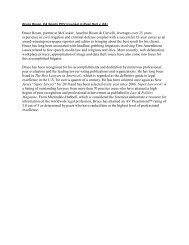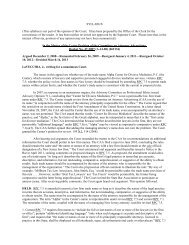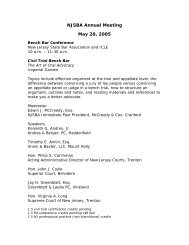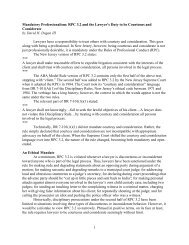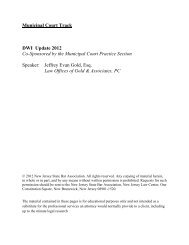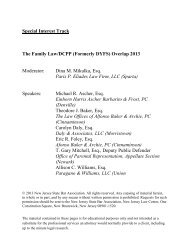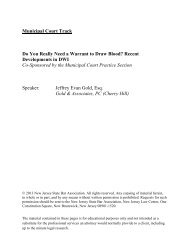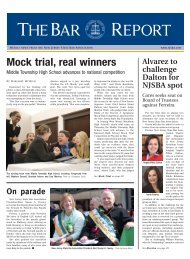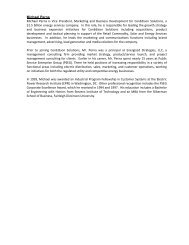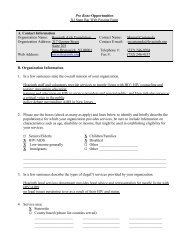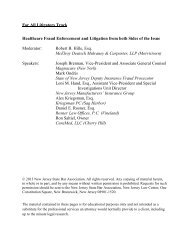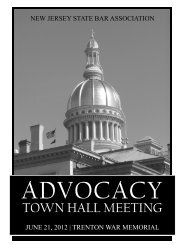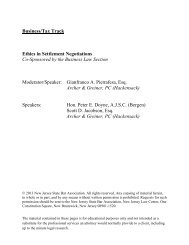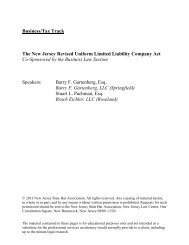State v. Henderson and the New Model Jury Charges - New Jersey ...
State v. Henderson and the New Model Jury Charges - New Jersey ...
State v. Henderson and the New Model Jury Charges - New Jersey ...
You also want an ePaper? Increase the reach of your titles
YUMPU automatically turns print PDFs into web optimized ePapers that Google loves.
a-8-08.opn.html<br />
The parties devote much attention to this issue. But <strong>the</strong> debate relates largely<br />
to <strong>the</strong> need for enhanced jury instructions <strong>and</strong> <strong>the</strong> possible use of expert<br />
testimony. Left unanswered amidst many objections is this question: if even<br />
only a small number of jurors do not appreciate an important, relevant concept,<br />
why not help <strong>the</strong>m underst<strong>and</strong> it better with an appropriate jury charge?<br />
Survey questionnaires provide <strong>the</strong> most direct evidence of what jurors know<br />
about memory <strong>and</strong> eyewitness identifications. Researchers conducting <strong>the</strong><br />
surveys ask jurors questions about memory <strong>and</strong> system <strong>and</strong> estimator variables.<br />
The results can <strong>the</strong>n be compared to expert responses in separate surveys.<br />
Survey studies have generated varied results. The Special Master relied on<br />
data from a 2006 survey (<strong>the</strong> “Benton Survey”) that asked 111 jurors in<br />
Tennessee questions about eyewitness identification <strong>and</strong> memory. See Tanja<br />
Rapus Benton et al., Eyewitness Memory Is Still Not Common Sense:<br />
Comparing Jurors, Judges <strong>and</strong> Law Enforcement to Eyewitness Experts, 20<br />
Applied Cognitive Psychol. 115, 118 (2006). Juror responses differed from<br />
expert responses on 87% of <strong>the</strong> issues. Id. at 119-21. Among o<strong>the</strong>r issues, only<br />
41% of jurors agreed with <strong>the</strong> importance of pre-lineup instructions, <strong>and</strong> only<br />
38% to 47% agreed with <strong>the</strong> effects of <strong>the</strong> accuracy-confidence relationship,<br />
weapon focus, <strong>and</strong> cross-race bias. Id. at 120. By comparison, about nine of ten<br />
experts agreed on <strong>the</strong> effects of all of those issues. Ibid.<br />
The <strong>State</strong> disputes <strong>the</strong> Benton study for various reasons <strong>and</strong> instead<br />
highlights results from Canadian surveys conducted in 2009, which showed a<br />
substantially higher level of juror underst<strong>and</strong>ing. See J. Don Read & Sarah L.<br />
Desmarais, Expert Psychology Testimony on Eyewitness Identification: A<br />
Matter of Common Sense?, in Expert Testimony on <strong>the</strong> Psychology of<br />
Eyewitness Identification, at 115, 120-27. The majority of jury-eligible<br />
participants in those surveys agreed with experts on <strong>the</strong> importance of lineup<br />
instructions, <strong>the</strong> accuracy-confidence relationship, cross-race bias, <strong>and</strong> weapon<br />
focus. See id. at 121-22. Still, as <strong>the</strong> survey authors acknowledged, “substantial<br />
differences in knowledge <strong>and</strong> familiarity between experts <strong>and</strong> laypersons were<br />
readily apparent for 50% of <strong>the</strong> eyewitness topics.” Id. at 127.<br />
Mock-jury studies provide ano<strong>the</strong>r method to try to discern what jurors<br />
know. The <strong>State</strong> argues that mock-jury research is unreliable because it is not<br />
http://njlaw.rutgers.edu/collections/courts/supreme/a-8-08.opn.html[4/15/2013 6:04:23 PM]



